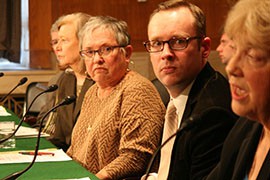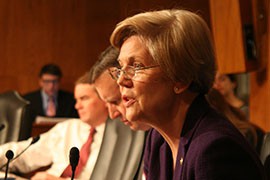Cronkite News has moved to a new home at cronkitenews.azpbs.org. Use this site to search archives from 2011 to May 2015. You can search the new site for current stories.
ASU dean testifies to Senate panel considering teacher preparedness
WASHINGTON – The dean of Arizona State University’s teachers college told a Senate panel Tuesday that better academic performance in kindergarten through high school begins with better teacher-preparedness programs at higher education institutions.
“It takes an entire university, an entire community, to prepare a teacher,” Mari Koerner told the Senate Health, Education, Labor and Pensions Committee.
Koerner, dean of the Mary Lou Fulton Teachers College, was one of five experts testifying at a nearly two-hour hearing on ways to reduce the number of unprepared teachers.
Committee members argued for the most part that many programs still need a lot of improvements.
Colleges are pushing out new teachers who “are not ready to teach,” said Sen. Tom Harkin, D-Iowa. Harkin, the committee chairman, said most of them “report feeling unprepared for the reality of the classroom.”
Harkin said programs are preparing too many elementary school teachers and not enough early childhood specialists, special education or English-language learning teachers. Part of the problem could be K-12 schools that are not effectively communicating their needs to colleges, he said.
Sen. Elizabeth Warren, D-Mass., said she worries about a federal program that gives grants of up to $16,000 to undergraduates pursuing a teaching career. The catch is that grant recipients who do not end up teaching in a high-needs school for at least four years have to pay back the federal government, turning the “so-called grants” to loans.
“I’m concerned whether this program is actually helping support students who want to be teachers or if it’s just loading other students with a lot of debt,” Warren said.
She noted that the president’s latest budget request said close to 75 percent of the TEACH grant recipients end up paying back the government. Warren said it might be because so many colleges are offering the grants to students not yet committed to teaching.
Even for those who are committed to teaching, however, “the TEACH grant program can still put prospective teachers in financial disadvantages when colleges supplant their own institutional grants with TEACH grants.”
At ASU – one of the nation’s largest TEACH-grant beneficiaries – Koerner said the federal grants are maintaining the influx of students each year.
“The TEACH grants are essential for us to recruit the kids that we want to bring in teacher education,” Koerner said.
Sen. Michael Bennet, D-Colo., said some programs might need to be changed or shut down. But Timothy Daly, president of the New Teacher Project, said closing low-performing programs is not the answer.
“I think that you’ll never win that fight,” Daly said. Instead, he proposed that “at the federal level, make it less expensive. Provide subsidies to go to the places that are believed to be high-performing because people will respond to the economics of it.”
Whatever the solution, Bennet said something needs to be done.
“A lot of people wonder whether if we even have a national issue with respect to education,” Bennet said. “To me, the fact that we’re going to have to replace almost 2 million teachers in the next decade is at least of national interest.”








